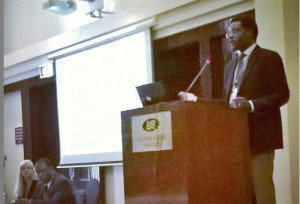“There is no better time to launch the Africa Sustainability Hub than now,” says Dr Mohamed Kyari from the Human Resources, Science and Technology Department of the African Union. The AU strategy science and technology and innovation was confirmed by Heads of State last June. The vision of the African Union is to develop a strategy for development led by African citizens. Sustainability is a priority area across all the pillars of work. “We cannot live without sustainability,” Dr Kyari says.
The AU African climate change strategy points towards mitigation, adaptation and capacity building activities, Dr Kyari observes, urging the new Hub – called STEPS Africa – to engage with all aspects of the AU’s strategy. As Virinder Sharma from DFID Kenya argued, “climate change cannot be an add-on, but it must be central” – to agriculture, transport, risk management and cash transfers, urban construction, private sector technology development, development financing and so on. £235m is allocated to Kenya from the UK’s contribution to the International Climate Fund for a range of activities, attempting to work cohesively across government, private sector and civil society.
STEPS Africa – a network currently  hosted by the African Centre for Technology Studies (ACTS) with African Technology Policy Studies Network (ATPS) and SEI-Africa, and part of the emerging STEPS Global Sustainability Transformation – plans to work closely with African policymakers, and contribute to the AU goals. The Hub was launched at a workshop, Low Carbon Development in Africa, today. Cosmas Ochieng, Executive Director of ACTS, invited the AU to be part of the new networked Hub in order to link the it’s work to pan-African policymaking.
hosted by the African Centre for Technology Studies (ACTS) with African Technology Policy Studies Network (ATPS) and SEI-Africa, and part of the emerging STEPS Global Sustainability Transformation – plans to work closely with African policymakers, and contribute to the AU goals. The Hub was launched at a workshop, Low Carbon Development in Africa, today. Cosmas Ochieng, Executive Director of ACTS, invited the AU to be part of the new networked Hub in order to link the it’s work to pan-African policymaking.
The Malawi High Commissioner to Kenya, Dr Perks Ligoya, also welcomed the launch of the Hub. Malawi is suffering the effects of climate change, and there is a real need to link climate challenges with agricultural and livelihood development, he observed. As government representatives to the United Nations Environment Programme (UNEP), he suggested that Hub partners should contribute to framing the debates within the UN and other fora. “We can set agendas, not from New York, but right from here, based on your findings”. Solutions, he says, “need to take account of economic and social rights, as well as protecting the environment.” “Arresting a woman collecting charcoal does not help anything,” he argued. We need sustainable solutions that “tackle both poverty and improve the environment.”
Ato Dina Mufti Sid, Ethiopia’s Ambassador to Kenya, explained his government’s commitment to a ‘green economy’. This he says is based on low carbon economy that can produced green energy, including making use of hydroelectric power from the building of new dams across the country. This particular pathway to green energy is of course highly controversial, and raises the question of which pathways to a low carbon transition are most equitable and sustainability.
As the government representatives from Ethiopia, Malawi and Kenya showed in the presentations at the STEPS Africa launch event, there are multiple pathways to sustainability transformations. The Africa hub will bring research evidence to these debates, and will engage with policymakers, business and civil society. Linking research with policy engagement around transformations to sustainability is a core ambition of the Africa Sustainability Hub, argued hub-lead, Dr Ochieng.
Linking to other hubs in different parts of the world as part of the STEPS Global Consortium will allow for the sharing of experiences and joint learning in different contexts. As Dr Ligoya commented, he has just come from a posting in India, where a range of low carbon technologies have become core parts of development in rural and urban areas. Sharing these experiences in Africa will be important through hub connections. Equally, debating the politics of sustainability pathways, and exposing the trade-offs for different directions of low carbon investment will be a central part of cross-hub exchange across the Consortium.
Photo: Cosmas Ochieng, Executive Director of ACTS, opens the workshop
More blogs from the Low Carbon development in Africa workshop
- Africa Sustainability Hub will promote low-carbon opportunities by David Ockwell, 19 June 2015
- Pro-poor, low carbon energy conversations across the STEPS global consortium by Adrian Ely, 16 June 2015
- STEPS Africa Sustainability Hub launched in Nairobi by Ian Scoones, 10 June 2015
- Kenyan Finance Minister: STEPS Africa “a huge contribution” by Ian Scoones, 10 June 2015
- Knowledge is power: towards low carbon energy in Africa by Nathan Oxley, 10 June 2015
- Why access to energy is crucial for economic growth and poverty reduction by Ian Scoones, 10 June 2015